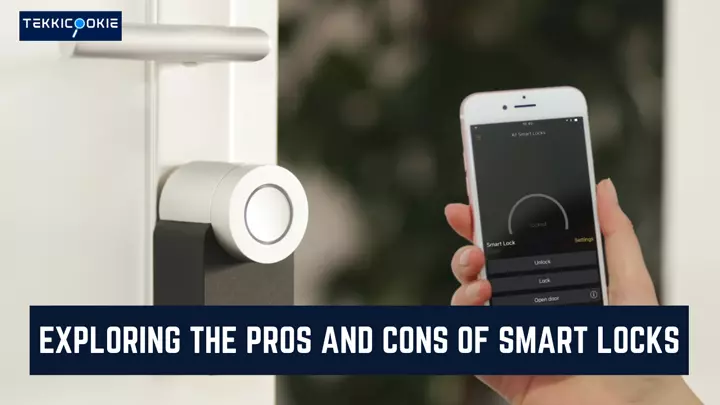In an era where technological advancements are reshaping our daily lives, it’s no surprise that even something as mundane as locking and unlocking doors has received a digital makeover. Say goodbye to traditional locks and embrace the rise of smart locks.
These innovative security solutions offer a range of benefits, but like any technology, they also come with their fair share of drawbacks.
In this article, we’ll delve into the advantages and disadvantages of smart locks, shedding light on whether they truly hold the key to a more convenient and secure future.

Advantages of Smart Locks
1. Enhanced Convenience: Bid farewell to fumbling for keys or worrying about losing them. Smart locks allow you to unlock your doors with ease using your smartphone, a key fob, or even your voice. No more juggling groceries or fidgeting with keys in the rain—entering your home becomes a breeze.
Imagine approaching your front door with arms full of shopping bags, and with a simple tap on your smartphone, the door unlocks magically. Convenience at its finest!
2. Keyless Entry: Ever had that moment of panic when you can’t find your keys? Smart locks eliminate that worry altogether. With password access or biometric recognition (such as fingerprints or facial recognition), you’ll never have to frantically search for your keys again. Simply tap, swipe, or look, and you’re in.
Plus, you can easily grant temporary access to guests, service providers, or even delivery personnel, saving you the hassle of making extra copies of physical keys.
3. Remote Control: Forgot to lock the door? No problem. Smart locks offer the convenience of remote access, allowing you to lock or unlock your doors from anywhere using a smartphone app.
Whether you’re at work, on vacation, or lounging on the couch, you’ll have complete control over your home’s security. Even if you’re halfway around the world, you can double-check and secure your front door with a tap on your smartphone. Peace of mind at your fingertips!
4. Smart Integration: Imagine your home unlocking the front door, turning on the lights, and adjusting the thermostat as you approach—all without lifting a finger. Smart locks seamlessly integrate with other smart devices, creating a cohesive and automated ecosystem for your home.
It’s like having a personal doorman but without a fancy hat. As you arrive home, the lights switch on, the temperature adjusts to your preferred comfort level, and your door swings open, welcoming you inside. A true game-changer!
Read More: 6 Reasons Why Smart Lock Home Assistant is a Must-Have
Disadvantages of Smart Locks
1. Cybersecurity Concerns: With connectivity comes vulnerability. Smart locks rely on wireless technology, which can be susceptible to hacking attempts or security breaches. While manufacturers continuously work to improve security measures, it’s crucial to stay vigilant and keep your devices updated to minimize potential risks.
Opting for reputable brands and following recommended security practices will help safeguard your home against digital intruders.
2. Dependency on Power: Smart locks are powered by electricity, whether through batteries or a wired connection. In the event of a power outage or battery failure, you may find yourself locked out of your own home.
It’s wise to have a backup plan, such as a physical key or alternative entry method, to avoid being left high and dry. Remember, even the most advanced technology can encounter power-related glitches.
3. Compatibility Constraints: Not all smart locks are created equal. Some may only be compatible with specific door types or require additional hardware for installation. Before investing in a smart lock, ensure it’s compatible with your existing door setup or be prepared for the additional cost and effort of making the necessary adjustments.
Researching compatibility and seeking professional advice can save you from purchasing a smart lock that doesn’t fit your specific requirements.
4. Initial Cost: Embracing the future comes with a price tag. Smart locks are generally more expensive than traditional locks, particularly if you opt for higher-end models with advanced features. While the long-term benefits may outweigh the initial investment, it’s essential to consider your budget and weigh the cost against the convenience.
Keep in mind that smart locks often provide an added layer of security, so the higher price may be justified in terms of protecting your home and loved ones.
Conclusion
Smart locks offer a tantalizing glimpse into the future of home security, blending convenience, connectivity, and cutting-edge technology. With their enhanced convenience, keyless entry, remote control capabilities, and integration with smart home systems, they undoubtedly bring a myriad of advantages to the table.
However, it’s vital to acknowledge the potential cybersecurity risks, reliance on power, compatibility constraints, and initial costs that come with adopting this new wave of lock technology.
Like any decision, the choice to embrace smart locks ultimately depends on your specific needs, priorities, and risk tolerance. While they offer a futuristic and streamlined approach to home security, it’s crucial to strike a balance between convenience and caution.
So, as you consider whether to unlock the potential of smart locks, weigh the pros and cons carefully and ensure that the doors to your home—and peace of mind—remain firmly within your control.
Remember, the key to a secure future lies in making informed choices that align with your lifestyle and security requirements.
Hey there, folks! If you have liked the article then don’t forget to give us a follow on our social media channels below. That way, you’ll be the first to know about all the exciting updates!